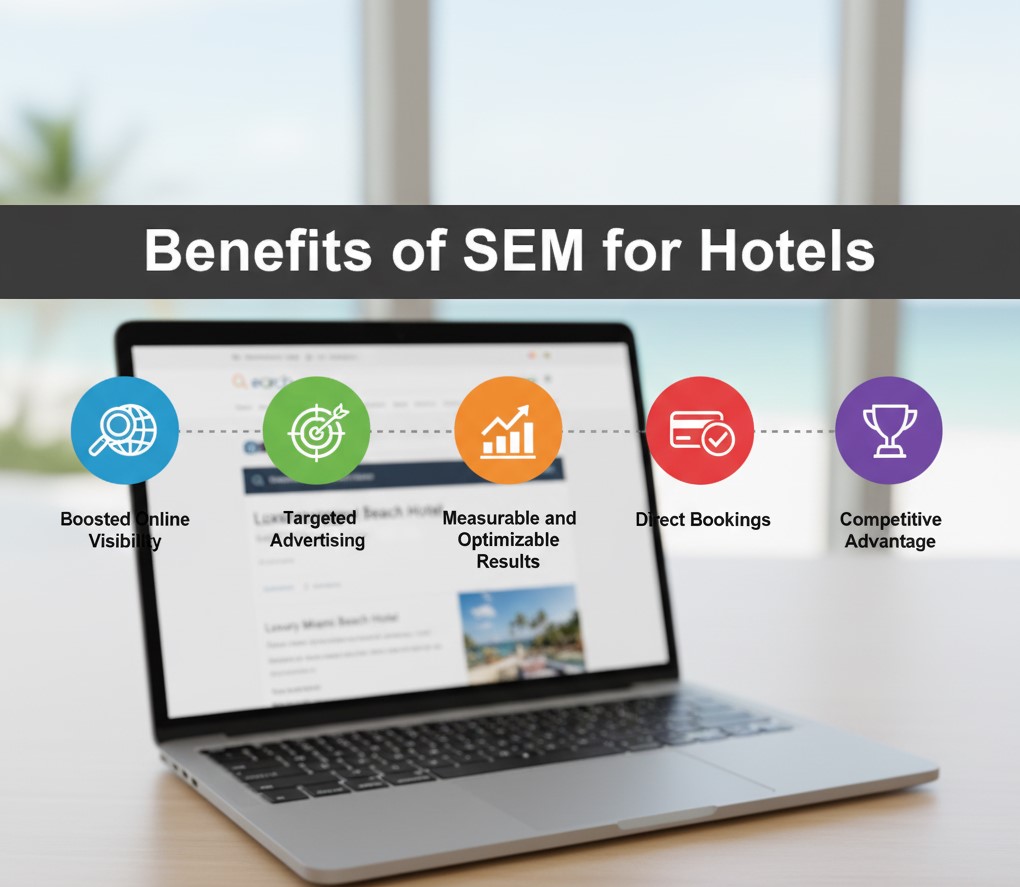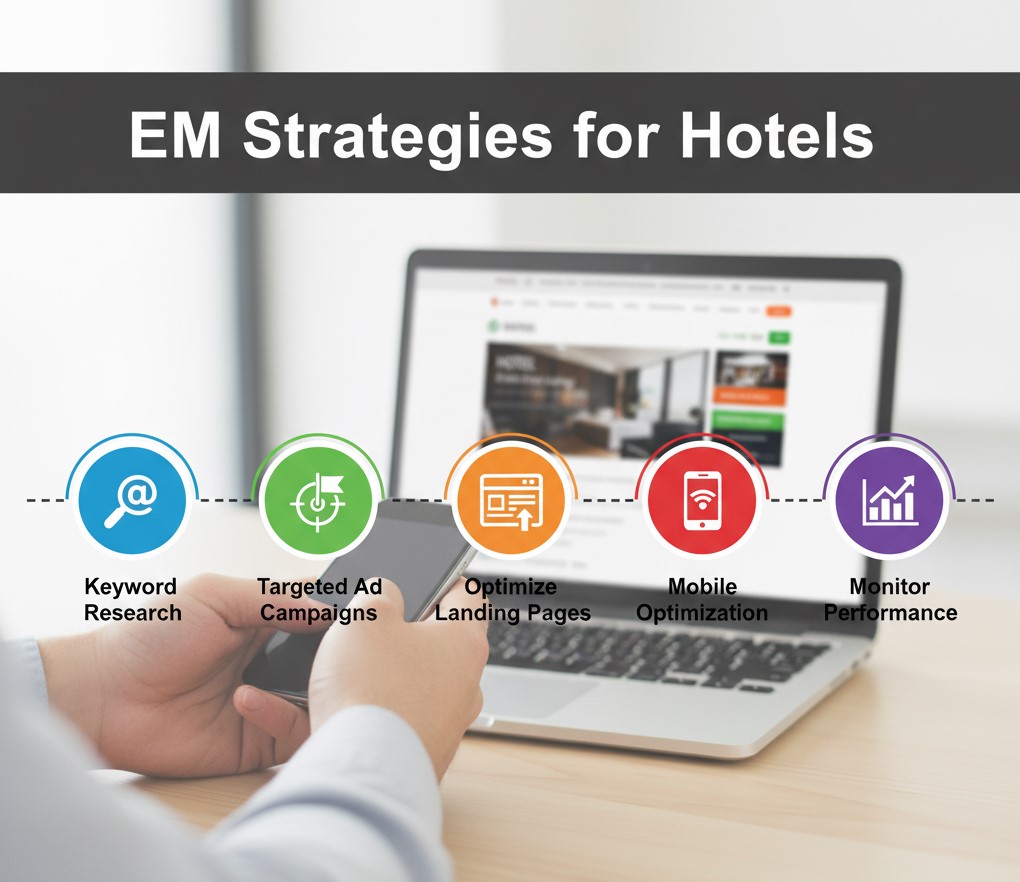
With the proliferation of digital booking channels and the evolving travel patterns, hotels are increasingly competing for guest attention. Search Engine Marketing (SEM) is essential to hotels in this day and age, as it enables them to attract guests, drive direct bookings, and remain on top in an overcrowded digital business landscape.
This blog will delve into the reasons why SEM is crucial for hotels, accentuate its importance, and list practical tactics on how to get SEM working for your property.
What is Search Engine Marketing (SEM) and Why Does it Matter for Hotels?
A form of digital marketing, Search Engine Marketing (SEM) means you pay for ads on search engines such as Google and Bing. They are those ads that show up at the top of search engine results pages (SERPs) when users type in certain keywords related to a business.
SEM is an absolute must for hotels to cut through the noise and appear visibly on the digital travel scene. With so many individuals turning to search engines to organize their trips, SEM is the way to ensure guests find your property before all the others. This isn’t just about being seen: SEM connects hotels with customers when it matters most, providing tangible outcomes.
To understand the broader impact of SEM across industries, explore why search engine marketing is vital for businesses today.
Benefits of SEM for Hotels

1. Boosted Online Visibility
Most travelers go online first when they’re looking for a place to stay. SEM places your hotel at the very top of search results, meaning your property is visible to those searching for terms like “beachfront hotels in Miami” or “luxury London stays.”
When your ads take top position in the SERPs, your hotel enjoys instant credibility and a better chance of grabbing the attention of potential guests. Such visibility is priceless, particularly for boutique or independent hotels seeking to rival large-scale hospitality brands.
2. Targeted Advertising
One of the biggest strengths of SEM is its ability to target with precision. Hotels can target based on demographics, geography, dates of travel, and even traveller segment targeting (e.g., ”pet-friendly hotels” or “hotels with pools”).
For example, if you are a property that caters to business travelers, then you will want to target users who are searching with terms such as “conference hotels near me”. This guarantees that your advertising dollar connects with an intended audience of travelers who are “most likely to book”.
3. Measurable and Optimizable Results
SEM differs from traditional advertising in that, with SEM, you receive measurable performance data. You get to see clicks, impressions, conversion rates, and of course, return on investment (ROI).
For hotels, it’s great because it allows you to keep iterating on your campaigns in the ways that will be most effective. If, for instance, one ad or keyword brings in more bookings than another, you can swiftly act to do more of what works and less of what doesn’t.
4. Direct Bookings
Online Travel Agencies (OTAs) such as Booking. com and Expedia charge steep commissions that can eat into a hotel’s profits. SEM is a way to get around these and drive potential guests directly to your hotel’s website.
When hotels optimise ad campaigns and direct potential customers to good landing pages, they can stimulate direct bookings that cut out OTA fees and cultivate long-term customer relationships.
5. Competitive Advantage in a Crowded Market
It is one of the most competitive industries worldwide today. SEM is the key differentiator that hotels can use to outrank competitors in search results.
For smaller or boutique hotels, SEM is the great equalizer and provides the means to increase visibility and focus on niche travelers. And with the right SEM campaigns in place, your property can even win more bookings than some brands with deep pockets.
SEM Strategies for Hotels

If you’re ready to leverage SEM for your hotel but aren’t sure where to start, these strategies will help guide you.
1. Keyword Research Made Simple
Keywords are the foundation of any successful SEM campaign. Start by identifying key search terms potential guests might use, such as the location of your hotel, amenities, or specific attributes (e.g., “budget Los Angeles hotels” or “hotels with rooftop pools”).
Use tools like Google Keyword Planner or SEMrush to discover high-performing keywords. Be specific to attract quality traffic that’s more likely to convert into bookings.
2. Create Targeted Ad Campaigns
Once you’ve nailed down your keywords, create ads that directly address the needs of your target audience. Include compelling headlines, clear value propositions, and strong calls to action like “Book Now” or “Limited-Time Offer.”
For example:
- Headline: “Luxury Beachfront Stays in Cancun”
- Description: “Experience unparalleled views and 5-star amenities. Book now and save 20% on stays this season.”
Segment your campaigns for different buyer types, such as families, couples, or solo travelers, to make your ads as relevant as possible.
3. Optimize Your Landing Pages
Effective SEM ads must lead to optimized landing pages that provide a seamless booking experience.
Make sure your landing page has:
- A clear, minimalistic design.
- Fast loading times.
- Photos of your property and rooms.
- Easy-to-use booking forms.
- Clear calls to action like “Check Availability.”
If your landing page isn’t welcoming, potential guests may abandon their search and turn to competitors.
4. Don’t Neglect Mobile Optimization
Nearly 70% of travel-related searches happen on mobile devices. If your ads and landing pages aren’t mobile-friendly, you risk losing significant traffic.
Ensure your website is responsive, loads quickly on mobile, and offers an intuitive booking experience. Ads and landing pages that cater to mobile users are crucial for capturing on-the-go travelers.
Why Every Hotel Should Adopt SEM
With the explosion of online travel planning, SEM has become more than just an advantage—it’s a necessity for hotels looking to thrive. By utilizing SEM, you can immediately enhance your hotel’s visibility, attract targeted travelers, and compete effectively in the digital space.
Whether you’re a boutique guesthouse or part of an international chain, SEM offers scalable and customizable solutions tailored to your goals. Plus, the ability to measure and refine your campaigns ensures that you’re always getting the most out of your investment.
Your Next Steps
Are you ready to put your hotel on the digital map? Start applying these SEM strategies to connect with travelers worldwide and boost direct bookings. For a deeper look into optimizing your search campaigns, set up a consultation with our SEM experts today.
With the right strategies in place, you’ll turn online searches into unforgettable stays.
Learn more about: The Ultimate Guide to Best Practices for SEM Success



Leave a Reply